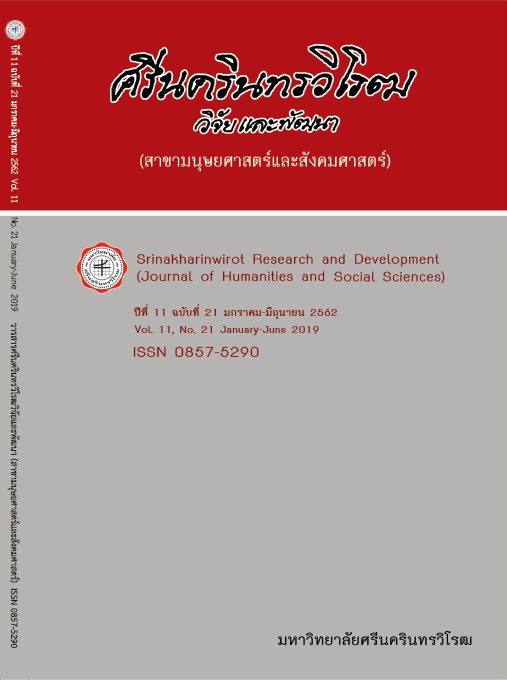ภาวะผู้นำการเปลี่ยนแปลง วัฒนธรรมองค์การ องค์การแห่งการเรียนรู้กับประสิทธิผลของเทศบาลนคร: การวิเคราะห์เส้นทาง TRANSFORMATIONAL LEADERSHIP CULTURE ORGANIZATION LEARNING ORGANIZATION AND ORGANIZATIONAL EFFECTIVENESS OF THE CITY MUNICIPALITIES: PATH ANALYSIS
Keywords:
Transformation Leadership, Culture Organization, Learning Organization, Organizational Effectiveness of the City MunicipalitiesAbstract
The purposes of this study are as follow 1) To aimed at transformational leadership, culture organization, learning organization and organizational effectiveness of the city municipalities. 2) To study the causal structural relationship of transformational leadership, culture organization, learning organization and organizational effectiveness of the city municipalities. and 3) To study suggest guidelines for developing organizational effectiveness of the city municipalities. Which study has unit of analysis was an organization level. This study was mixed method research a convergent parallel design. The Quantitative Research Instrument was a Questionnaire.The normative sample included 480 individuals. In statistics test by path analysis. As for the qualitative research instrument was a group of key informants experts group five the key part of the organization structural including 1) strategic apex 2) middle line 3) operative core 4) techno structure and 5) support staff. Qualitative data analysis by Miles and Huberman. As well the data analysis was processed using a merged data technique and a side-by-side comparison for merge data.
The results and findings the structural equation model of transformational leadership, culture organization, learning organization and organizational effectiveness of the city municipalities fitted to the empirical data was at excellence (c2/df = 1.198, df = 75, RMSEA = 0.024, RMR = 0.027, CFI = 1.00)Notably, this quantitative data analysis results were in conformity with the qualitative data analysis. This reflects the strength role of transformational leadership, culture organization was Important factor Influencing the transfer of learning organization to organizational effectiveness of the city municipalities as the chain of reason and the elements can not be separated at all or called the full model.
Downloads
References
[2] นิมิตร โสชารี. (2545). คุณลักษณะความเป็นผู้นำของคณะกรรมการบริหารองค์การบริหารส่วนตำบลที่เอื้อต่อกระบวนการมีส่วนร่วมของประชาชนในการดูแลรักษาต้นไม้ที่ปลูก ภายใต้โครงการตามพระราชเสาวนีย์ฯ: กรณีศึกษองค์การบริหารส่วนตำบลทุ่งชมพู อำเภอภูเวียง จังหวัดขอนแก่น.วิทยานิพนธ์ศิลปศาสตรมหาบัณฑิต (การบริหารการพัฒนา). มหาวิทยาลัยขอนแก่น.
[3] Bass; and Avolio. (1993). Transformational leadership: A response to critiques. In M. M. Chemers and R. Ayman (Eds.), Leadership theory and research: Perspectives and directions. (pp. 49-80). San Diego, CA: Academic Press.
[4] Denison. (2003). Corporate culture and Organizational effectiveness: Is There a similar pattern paround the world?. Advances in global leadership. 3: 205-227.
[5] Senge. (1990). The fifth discipline: the art and practice of the learning organization. New York: doubleday/currency.
[6] Steers. (1994). Introduction to organizational behavior. 2nd ed. New York: Harper collins publishers.
[7] Creswell; and Clark. (2011). Designing and conducting mixed methods research. 2nd ed.
Los Angeles, CA: Sage publication.
[8] Cochran. (1977). Sampling techniques. 3rd ed. New York: Wiley.
[9] Hair, G., Black, B., Babin, B., Anderson, R.; and Tatham, R. (2010). Multivariate data analysis. 7th ed. Pearson, Upper saddle river, New jersey.
[10] Comrey; and Lee. (1992). A first course in factor analysis. Hillsdale, NJ: Erlbaum.
[11] Henry Mintzberg. (1993). The structuring of organizations. Englewood cliffs, N.J.: Prentice hall.
[12] Miles; and Huberman. (1994). Qualitative data analysis. 2nd ed. Thousand oaks, CA: Sage publications.
[13] สุกัญญา สุขการณ์. (2552). ลักษณะผู้นำที่สัมพันธ์กับประสิทธิผลองค์การของเทศบาลในจังหวัดเขตปริมณฑลของกรุงเทพมหานคร. ดุษฎีนิพนธ์รัฐประศาสนศาสตร์ มหาวิทยาลัยราชภัฏสวนดุสิต.
[14] บุญแสง ชีระภากร. (2552). ภาวะผู้นำและการบริหารงานของผู้บริหารองค์การปกครองส่วนท้องถิ่น. วิทยานิพนธ์ปริญญาปรัชญาดุษฎีบัณฑิต (การพัฒนาทรัพยากรมนุษย์). มหาวิทยาลัยรามคำแหง.
[15] อัมพล ชูสนุก. (2552). อิทธิพลของภาวะผู้นำของซีอีโอต่อประสิทธิผลองค์การในบริบทของวัฒนธรรมองค์การของบริษัทโรงกลั่นน้ำมันในประเทศไทย. วิทยานิพนธ์ปริญญาปรัชญาดุษฎีบัณฑิต (บริหารธุรกิจ). มหาวิทยาลัยรามคำแหง.
[16] ทิพย์พาพร มหาสินไพศาล. (2553). ความสัมพันธ์เชิงสาเหตุระหว่างภาวะผู้นำ วัฒนธรรมองค์การ การจัดการความรู้ และผลการปฏิบัติงานของสถาบันอุดมศึกษาเอกชน. วิทยานิพนธ์ปริญญาศึกษาศาสตรดุษฎีบัณฑิต (การบริหารการศึกษา). คณะศึกษาศาสตร์ มหาวิทยาลัยเกษตรศาสตร์.
[17] วิทยา จิตนุพงศ์. (2554). แบบจำลองเชิงสาเหตุของปัจจัยที่มีอิทธิพลต่อภาวะความเป็นผู้นำของผู้บริหารองค์กรปกครองส่วนท้องถิ่นในประเทศไทย. วิทยานิพนธ์ปริญญาปรัชญาดุษฎีบัณฑิต (การพัฒนาทรัพยากรมนุษย์). มหาวิทยาลัยรามคำแหง.
[18] คมวัชร เอี้ยงอ่อง. (2555). ภาวะผู้นำ องค์การแห่งการเรียนรู้ กับประสิทธิผลองค์การของศาลยุติธรรม: ตัวแบบสมการโครงสร้าง. วิทยานิพนธ์ปริญญารัฐประศาสนศาสตรดุษฎีบัณฑิต คณะศิลปศาสตร์ มหาวิทยาลัยเกริก.
[19] Paul A. Sabatier; and Daniel A. Mazmanian. (1980, August). A multivariate approach to public policy making. American Journal of Political Science. 24(3): 439-445.
[20] รังสรรค์ อินทน์จันทน์. (2552). ปัจจัยที่มีผลต่อความก้าวหน้าการถ่ายโอนภารกิจให้แก่องค์กรปกครองส่วนท้องถิ่น : ศึกษาเฉพาะกรณีองค์การบริหารส่วนตำบล (อบต.) ในจังหวัดนครปฐม. วิทยานิพนธ์ปรัชญาดุษฎีบัณฑิต (รัฐประศาสนศาตร์). บัณฑิตวิทยาลัย มหาวิทยาลัยศรีปทุม.
[21] จิราภรณ์ พงษ์ศรีทัศน์. (2553). ปัจจัยด้านวัฒนธรรมองค์กรและจัดการความรู้ที่มีอิทธิพลต่อประสิทธิผลของมหาวิทยาลัยเทคโนโลยีราชมงคล. วิทยานิพนธ์ปริญญาปรัชญาดุษฎีบัณฑิต (การพัฒนาทรัพยากรมนุษย์). มหาวิทยาลัยรามคำแหง.
[22] สมจินตนา คุ้มภัย. (2553). การเปรียบเทียบวัฒนธรรมองค์การที่มีอิทธิพลต่อประสิทธิผลองค์การกรณีศึกษารัฐวิสาหกิจในประเทศไทย. วิทยานิพนธ์รัฐประศาสนศาสตรดุษฎีบัณฑิต คณะรัฐประศาสนศาสตร์ สถาบันบัณฑิตพัฒนบริหารศาสตร์.
[23] สิริพงษ์ ปานจันทร์. (2554). ประสิทธิผลในการบริหารงานของเทศบาลตำบลในจังหวัดนครปฐม. หลักสูตรปรัชญาดุษฎีบัณฑิต (รัฐประศาสนศาสตร์). มหาวิทยาลัยศรีปทุม.
[24] Cameron; and Quinn. (1999). Diagnosing and changing organizational culture. Reading, MA: Addison-Wesley.
[25] วนิดา สัจพันโรจน์. (2551). แนวทางการพัฒนาองค์การบริหารส่วนตำบลให้เป็นองค์กรแห่งการเรียนรู้ กรณีศึกษาจังหวัดสมุทรปราการ. วิทยานิพนธ์ปริญญาปรัชญาดุษฎีบัณฑิต (การพัฒนาทรัพยากรมนุษย์). มหาวิทยาลัยรามคำแหง.
[26] วรรณวิมล คงสุวรรณ. (2553). รูปแบบความสัมพันธ์เชิงสาเหตุองค์กรแห่งการเรียนรู้ทางการพยาบาลในโรงพยาบาลมหาวิทยาลัยของรัฐ. วิทยานิพนธ์ปริญญาปรัชญาดุษฎีบัณฑิต (การจัดการ).
บัณฑิตวิทยาลัย มหาวิทยาลัยคริสเตียน.
[27] ปรัชญา ชุ่มนาเสียว. (2553). รูปแบบกลยุทธ์การจัดการองค์การแห่งการเรียนรู้เพื่อการบริหารกิจการบ้านเมืองที่ดีในสถาบันอุดมศึกษาของรัฐ. วิทยานิพนธ์ปริญญาปรัชญาดุษฎีบัณฑิต (การพัฒนาทรัพยากรมนุษย์). มหาวิทยาลัยรามคำแหง.
[28] สุพิศาล ภักดีนฤนาถ. (2557). แนวทางการพัฒนากองบังคับการปราบปรามสู่องค์การแห่งการเรียนรู้.วิทยานิพนธ์ปริญญาปรัชญาดุษฎีบัณฑิต (การจัดการ) มหาวิทยาลัยนอร์ทกรุงเทพ.
[29] Ellinger, Yang; and Ellinger. (2000). The relationship between the learning organization concept and firm’s financial performance: An empirical assessment. Human resource development quarterly. 13: 5-22.
[30] ดรุณี โกเมนเอก. (2553). รูปแบบความสัมพันธ์ของปัจจัยเชิงสาเหตุต่อการเป็นองค์การแห่ง การเรียนรู้ของมหาวิทยาลัยราชภัฏ. วิทยานิพนธ์หลักสูตรปรัชญาดุษฎีบัณฑิต (การจัดการ). บัณฑิตวิทยาลัย มหาวิทยาลัยคริสเตียน.
[31] บัณฑิต ผังนิรันดร์. (2550). อิทธิพลของลักษณะขององค์การ นโยบายการบริหาร และการปฏิบัติงาน สภาพแวดล้อม การทำงานภายในองค์การ แรงจูงใจในการทำงาน ความพึงพอใจในงาน และความผูกพันต่อองค์การที่มีต่อประสิทธิผลของมหาวิทยาลัยราชภัฏสวนสุนันทา. ปริญญานิพนธ์ กศ.ด. (การอุดมศึกษา). กรุงเทพฯ: บัณฑิตวิทยาลัย มหาวิทยาลัยศรีนครินทรวิโรฒ.
[32] Max Weber. (1947). The theory of social and economic organization. Translated by A. M. Henderson & Talcott Parsons, The free press.
[33] Lussier. (2002). Teoría, Aplicación y Desarrollo de habilidades. (2a. Edición). México: Thomson Learning.
[34] Tichy, N.M., Frombrun, C.J.; and Devanna, M.A. (2002). Strategic human resource management. Sloan management review. 23(2): 47-61.
[35] Michael Armstrong. (1999). Armstrong's handbook of human resource management practice. 11th ed. London: Kogan page.
[36] Robert B. Denhardt; and Janet Vinzant Denhardt. (2007). The new public service. Printed in the United States of America.
[37] Stringer. (2002). Leadership and organization climate. New jersey: McGraw – Hill.
[38] Steers. (1994). Introduction to organizational behavior. 2nd ed. New York: Harpercollins Publishers.
[39] Robbins. (2005). Organizational behavior. 11th ed. Upper Saddle River, N.J: Pearson
[40] Glueck. (1988). Management. hinsdale: The dryden press. Hicks. Herbcrt G.
[41] Putti Joseph M. (1987). Management: A functional approach. Published by McGraw-Hill Education. Singapore.
[42] Davis; and Newstrom. (1985). Human behavior at work: Organization behavior. 7th ed. Singapore: Singapore National Printers.
[43] Barnard. (1972). The Functions of the excutives. Boston: Harvard University Press.
[44] Kimbrough; and Burkett. (1990). The principalship: concepts and practices. Englewood Cliffs, NJ: Prentice Hall.
[45] พงษ์เทพ จันทสุวรรณ. (2554, ตุลาคม – 2555, มกราคม). ภาวะผู้นำการเปลี่ยนแปลง วัฒนธรรมองค์การ องค์การแห่งการเรียนรู้และประสิทธิผลของหน่วยงานในสถานีตำรวจนครบาล. วารสารร่มพฤกษ์. 30(1): 89-116.
Downloads
Published
How to Cite
Issue
Section
License
Srinakharinwirot Research and Development Journal of Humanities and Social Sciences is licensed Under a Creative Commons Attribution-NonCommercial-NoDerivs 4.0 International (CC-BY-NC-ND 4.0) License, Unless Otherwise Stated. Please Read Journal Policies Page for More Information on Open Access, Copyright and Permissions.



